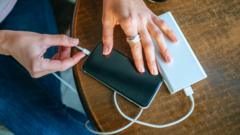Could a Power Bank Ignite Your Safety? Man Catches Fire at Melbourne Airport Lounge!

Published: 2025-11-07 02:00:24 | Category: technology
A lithium power bank ignited in a man's pocket at Melbourne International Airport, resulting in burns to his leg and fingers. This incident highlights the growing concerns surrounding the safety of lithium batteries, particularly in travel settings. As airlines and regulators reassess safety protocols, it raises questions about how passengers can safely carry such devices.
Last updated: 08 October 2023 (BST)
What’s happening now
The incident occurred on Thursday morning in the Qantas business lounge, where a man in his 50s suffered burns after his lithium power bank ignited. The quick response from staff helped to minimise injuries, as they assisted the man into a shower before paramedics arrived. Approximately 150 people were evacuated from the lounge due to the smoke. The man was treated for his injuries and later discharged from the hospital. Qantas is now reviewing its policies regarding the carrying of lithium batteries, and updates are expected shortly.
Key takeaways
- A man suffered burns from a lithium power bank explosion in a Qantas lounge.
- About 150 people were evacuated due to smoke from the incident.
- Qantas is reviewing its policies on lithium batteries.
- Many airlines now advise keeping power banks in easy reach during flights.
- Several international airlines have banned the use of power banks during flights.
Timeline: how we got here
The following timeline outlines significant events related to lithium battery incidents in aviation, culminating in the recent Melbourne airport incident:
- January 2023: A fire in South Korea, attributed to a lithium power bank, destroyed a passenger plane.
- July 2023: A fire on a Virgin Australia flight from Sydney to Hobart was linked to a power bank in an overhead locker.
- October 2023: A man suffered burns at Melbourne International Airport due to a power bank explosion, prompting immediate evacuations and policy reviews by Qantas.
What’s new vs what’s known
New today/this week
The recent incident involving a lithium power bank at Melbourne airport has triggered immediate safety concerns and prompted Qantas to review its policies. As a direct response, updates regarding the transport and use of lithium batteries are anticipated shortly.
What was already established
Numerous airlines, including Emirates and Cathay Pacific, have previously restricted the use of power banks and charging during flights due to fire hazards. Guidelines recommend that passengers keep power banks within easy reach rather than stowing them in overhead compartments.
Impact for the UK
Consumers and households
For UK travellers, this incident serves as a reminder to exercise caution with lithium batteries. As airlines adjust their policies, UK consumers may notice changes in regulations regarding power bank usage during flights. It may also affect travel plans if airlines implement stricter guidelines.
Businesses and jobs
The incident could have broader implications for airlines and manufacturers of lithium batteries. Increased scrutiny may lead to updated manufacturing practices and additional training for airline staff regarding emergency responses to battery fires. This could also impact compliance and operational protocols across the aviation sector.
Policy and regulation
UK and devolved administrations may take cues from the incident, potentially leading to new regulations concerning the transport of lithium batteries. As international safety standards evolve, UK agencies will likely monitor developments closely to ensure passenger safety.
Numbers that matter
- 150: The number of people evacuated from the Qantas lounge due to the smoke from the fire.
- 2: The number of power banks often allowed by airlines for personal use, depending on their capacity.
- 100Wh to 160Wh: The capacity range for power banks that some airlines permit.
- 1: The number of fires caused by lithium batteries that destroyed a passenger plane in South Korea.
- 1: The number of incidents on a Virgin Australia flight caused by a power bank in an overhead locker.
Definitions and jargon buster
- Lithium power bank: A portable device used to charge electronic devices that contains lithium-ion batteries.
- Wh (Watt-hour): A unit of energy equivalent to one watt of power used for one hour, often used to measure battery capacity.
- Qantas: An Australian airline known for its international and domestic flights.
How to think about the next steps
Near term (0–4 weeks)
In the immediate future, travellers should remain vigilant regarding the use of lithium batteries, especially power banks. Expect potential announcements from airlines regarding revised policies. Passengers should also consider checking with their airline about any specific guidelines in light of recent events.
Medium term (1–6 months)
Over the next few months, airlines may implement stricter regulations on the transport of lithium batteries. Travellers should be prepared for changes in boarding procedures, including how and where to store such devices during flights.
Signals to watch
- Updates from Qantas and other airlines regarding lithium battery policies.
- New regulations or advisories from aviation safety authorities.
- Reports of any further incidents involving lithium batteries on flights.
Practical guidance
Do
- Keep power banks in your carry-on luggage and within easy reach during flights.
- Follow airline guidelines regarding battery capacity and quantity.
- Regularly check for updates on safety regulations related to lithium batteries.
Don’t
- Store power banks in overhead compartments.
- Charge power banks while in your luggage.
- Ignore any airline-specific advisories concerning battery safety.
Checklist
- Ensure your power bank is compliant with airline capacity limits.
- Keep your power bank charged before travel.
- Familiarise yourself with the location of emergency exits and safety equipment on your flight.
- Always monitor for any updates from your airline about travel safety.
- Have a plan for managing battery-powered devices during your flight.
Risks, caveats, and uncertainties
While the recent incident at Melbourne International Airport has raised awareness about the dangers associated with lithium batteries, it's important to note that not all power banks pose a significant risk. Factors such as quality, age, and usage history can influence battery performance. Nevertheless, passengers should remain cautious and follow safety guidelines to mitigate potential risks.
Bottom line
The incident involving a lithium power bank at Melbourne airport serves as a critical reminder of the potential hazards of these devices in travel settings. As airlines reassess safety protocols, passengers should stay informed about regulations and best practices to ensure their safety while travelling with electronic devices.
FAQs
What should I do if my power bank catches fire during a flight?
If a power bank catches fire during a flight, alert the cabin crew immediately. They are trained to handle such emergencies. Use a fire extinguisher if safe to do so, but evacuate if the fire cannot be controlled.
How can I safely pack my power bank for travel?
To safely pack your power bank, keep it in your carry-on luggage and avoid stowing it in overhead compartments. Ensure it complies with airline regulations regarding size and capacity.
Are there any airlines that completely ban power banks?
Yes, several international airlines, including Emirates and Cathay Pacific, have implemented bans on the use of power banks during flights due to safety concerns.



